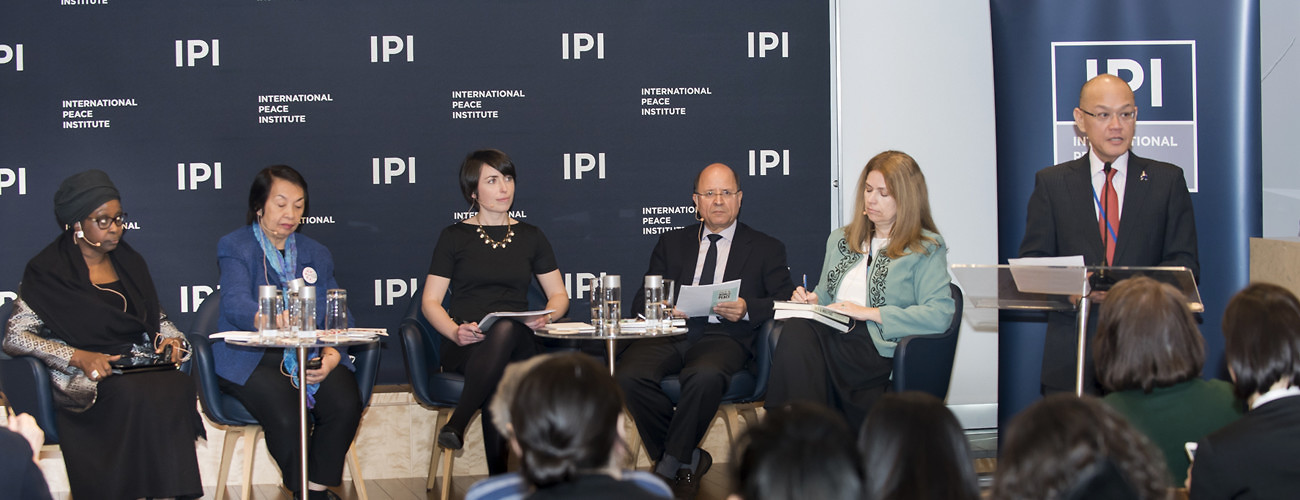Mounting evidence shows that women’s involvement not only speeds peace negotiations, it also leads to peaceful relations between states, according to a group of gender experts and peacemakers speaking at IPI on March 12th.
Discussing “Gender Equality and Peaceful Societies: From Evidence to Action,” a policy forum co-hosted by IPI and the Permanent Mission of Thailand to the UN and taking place on the sidelines of the 59th session of the Commission on the Status of Women at UN headquarters, the panelists explained the nature of the link between women’s empowerment and peacemaking.
“There can be no sustainable peace without the participation of women in global regional and national peace and political processes,” said Thailand’s Permanent Representative to the UN, Virachai Plasai, in opening remarks. “But what really is the evidence that underlies that connection, and how can we use that evidence to inform our action?”
Academics as well as practitioners are increasingly relying on research and data to answer that question. Valerie Hudson, a professor at Texas A&M University and a co-author of Sex and World Peace, said gender equality affects state security in a large number of ways.
Whether it’s food security, health, demographics, or economic prosperity, the answer lies in how women are treated, she argued. “[There is] plenty of evidence that the overall general health of a nation is dependent upon the status and treatment of women,” she said, underscoring the importance of evidence in making a convincing case for women’s empowerment.
Ms. Hudson, who is also the founder of the WomenStats database, a project that studies the relationship between the security of women and the security of states, said data gathering is essential, but at times difficult. “We want to get the data and present it in graphic forms so that we can see what the disconnect is between high-level statements and what happens on the ground,” she said.
The proliferation of conflicts around the world today points to the dangers of marginalizing women in peacebuilding, some of the panelists noted. The African Union’s Special Envoy for Women, Bineta Diop, said women have long been excluded from peace negotiations, while evidence from the ground suggests that when women are included in peace processes, conflicts are less likely to relapse—a finding also reached by an ongoing IPI research project on the topic.
Citing examples from the Democratic Republic of the Congo, Burundi, South Sudan, and the Central African Republic, Ms. Diop said the role of women has been crucial in providing a momentum for peace. “[In South Sudan,] the only group who are reconciling right now are the women,” she said. “And in the Central African Republic, the Muslim and Christian women are the only ones talking, saying that they want to reconcile,” she continued. “They always give hope [and] what they need is… support.”
However, including women in peace negotiations is not always simple, the panelists noted. There are several barriers standing in the way of full inclusion for women, said Irene Santiago, a former negotiator with the Philippine government and now the leader of the Women Seriously movement. She said these barriers not only make inclusion challenging; they also make it difficult for women to be seen as credible negotiators.
“How do you get in, how do you stay in, but also how do they take you seriously?” she asked. Recalling her own difficulty being accepted as a peace negotiator, she said it takes a great deal of courage to confront existing conventions and barriers. “And where does that audacity come from? That audacity comes from knowing you have women beside you and behind you,” she said.
Once women are let in, the key is to maintain credibility by showing expertise, she said. “I learned that I was going to be marginalized if I was going to be seen as a gender expert, because gender is seen as a soft issue—they are going to tune you out,” she recalled. Instead, she decided to gain expertise in a specific area, which in her case were cease-fires. That made her valuable in the eyes of the other negotiators.
Another part of breaking down gender barriers involves working on men’s perception of the issue, the panelists said. IPI Senior Adviser Youssef Mahmoud, a native of Tunisia, said that in the Middle East, a region often seen as traditionally patriarchal, things may be moving in the right direction. He pointed to Algeria and Morocco, where the governments have created programs to train women imams, teaching and interpreting the Quran. And he noted how Algeria is now asking women to support its de-radicalization efforts.
“Men have realized that there is no change without women,” said Mr. Mahmoud, who is also a member of the UN-appointed High-Level Panel on Peace Operations. “They are realizing that a world where 51 percent [of the population] are ignored is a dangerous world, for everyone.”
IPI Research Fellow and Editor Marie O’Reilly moderated the conversation.
Watch event:
Related News Coverage:
“Four Ways Women Bring Lasting Peace to the Table,” Inter Press Service, March 25, 2015








